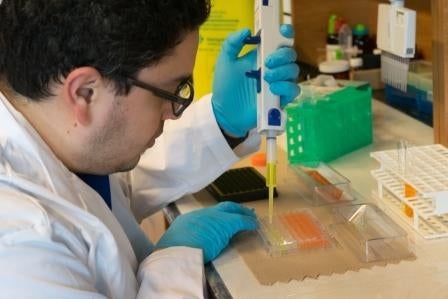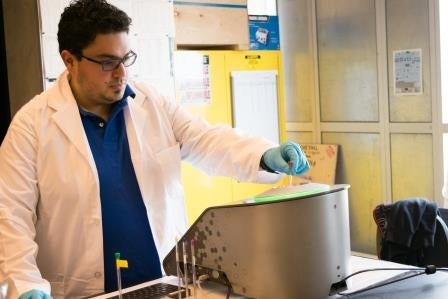One, two, three. It takes just three seconds for a new case of Alzheimer’s to develop worldwide. As of 2015, Alzheimer’s affects nearly 50 million patients and has a global economic cost of $820 billion. In Canada alone, about 1 million patients suffer from this devastating disorder. In short, Alzheimer’s is a cureless, debilitating, and costly disease.

PhD candidate Tarek Mohamed has spent the last seven years of his graduate studies tackling the complexities of Alzheimer’s and is a recent recipient of the Paul Christie Memorial Award, the Alzheimer’s Association travel award and the Canadian Institute of Health Research Institute of Aging travel award in recognition of his mental health research.
Why research Alzheimer’s?
“Your brain is a powerhouse,” Tarek says, explaining his rationale for studying Alzheimer’s in both his Master’s and PhD. “It is central to your identity. Remember your wedding day, the birth of your child, your first kiss, the passing of a loved one – we all experience these events in a unique fashion. Now imagine a disease that slowly erases and eats away at your brain. You lose your identity and everything you ever held dear.”
But Alzheimer’s is a vast condition, and one that needs to be approached from a variety of angles.
The problems that come together to create this disease are very complex. Like peeling an onion, each layer is fragile yet full of information. The research I do is meant to help peel those layers and reveal how the pieces of the puzzle fit in. The outcomes play out like a giant CSI case – a Cognitive Science Investigation.
Building molecules to improve treatment
Tarek began his investigation of Alzheimer’s in 2009 when he joined Dr. Praveen Nekkar’s lab as a Master’s student.
To combat the disease, Tarek discovers and develops bioactive small-molecules that are built to target various problems in the Alzheimeric brain. The intention is to create a single medication that can target two or more problems simultaneously. He calls it a “two birds, one stone” approach.
“For example, a few years ago, you’d carry around a mobile phone, a ledger, a music player and some cash – a collection of specialized items for dedicated tasks. Today, the almighty smart phone can accomplish all these tasks, and more, seamlessly and effectively.”
While traditional drug discovery and development focuses on one problem and develops the best solution to it, the complexity of Alzheimer’s necessitates an equally complex approach. Tarek’s research explores this multidimensionality.

“You have multiple areas of concern but no mono-targeting drug can cure them all. You can’t keep loading patients with more and more pills to address each concern separately.”
Hence, the “two birds, one stone” tactic for developing next-generation drugs. Create the “smartphone-equivalent” medication and address multiple parts of the disease without compromising patient safety.
Grad school lessons learned
Seven years is a big time investment, and Tarek’s made the best of his time as a student. He’s been a lab manager in the Nekkar lab and a leader on the Pharmacy Graduate Association. With graduation in August, he’s exploring national and international avenues for the next stage of his career.
I don’t think anyone who goes through graduate school comes out the same person. It’s part of the challenge. The research challenges you. Your lifestyle challenges you. Your emotions challenge you. Even the aftermath is challenging.
But as his recent awards suggest, Tarek’s overcome those challenges. He’s found success and bolstered the fight against a debilitating disease.